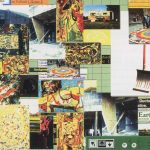Andruid Kerne
Most Recent Affiliation:
- Tufts University
Location:
- Medford, Massachusetts, United States of America
Writings and Presentations:
-
Title:
doing interface ecology: the practice of metadisciplinary
Writing Type: Paper
Author(s):
Exhibition: SIGGRAPH 2005: Threading Time
Abstract Summary:The interface can be modeled as a an ecosystem: connected, dynamic, and characterized by relationships. The model is predicated on a process of working with the interface as a border zone between heterogeneous systems of representation. This paper uses sensation, embodiment, and semiotics to initiate this process, by addressing the range of systems of representation that are involved in its own production. This presence of the theorist is found to create a self-referential metastructure. As an alternative to the beneficial but ad hoc assemblages of multi-, inter, and trans-disciplinary approaches, the ecosystems approach establishes that meshing of systems of representation is an inherent property of interface phenomena. The meshing process causes elements from the involved representational systems to recombine, forming hybrids. Recombinant information is a structural formula for creating new knowledge, which can be invoked for that purpose, intentionally. Theorists are part of the environment that they theorize about. The products of theorizing are information artifacts that are also part of the environment. They themselves function as interfaces. The term “metadisciplinary” is developed to describe the inherent and self-referential nature of this structure. The structure of metadisciplinarity connects theory and practice. This stands in direct contrast with studies approaches, such as performance studies, which is separate from theater practice.
[Download PDF]
Title: Interface Ecosystem, The Fundamental Unit of Information Age Ecology
Writing Type: Paper
Author(s):
Exhibition: SIGGRAPH 2002: Art Gallery
Abstract Summary:The Information Age is the period of history in which products and services based on information and knowledge have principal economic value. Information artifacts are implements of use and aesthetic expressions that both reflect and create the ways in which people individually and collectively think and act. Interactive artifacts are designed to engage people in access to and development of knowledge and information. Their human computer interfaces are instances of a broader set of phenomena. Cultural, creative, technological, and everyday frames of reference, spoken languages, economic positions, programming languages, and runtime platforms converge through the lens of the interface nexus. It is necessary to abstract and extend our notion of interface and to contextualize the operation of interfaces amidst dynamic meshworks, in order to address these phenomena.
With regard to life on earth, ecology investigates the web of relations between interdependent organisms and their surroundings. In the Information Age, people, activities, codes, components, and systems form the same kinds of interrelationships. Interfaces are the multidimensional border zones through which these relationships are constituted. Interface ecology investigates the dynamic interactions of media, cultures, and disciplines that flow through interfaces. The semiotic encodings of these wide-reaching systems of representation are their interactions’ building blocks. Interfaces recombine semiotic codes, forming hybrids.
The ecosystems approach brings the perspectives of diverse disciplines to bear on what interfaces are, how they work, and how they can work. Disciplines, and the media, cultural, and epistemological forms to which they apply, are free to relate in meshworks, opening inquiry. No system of representation dominates; none are considered subordinate. Rather, they are interdependent elements, connected by referential flows of interaction.
[Download PDF]
Role(s):





